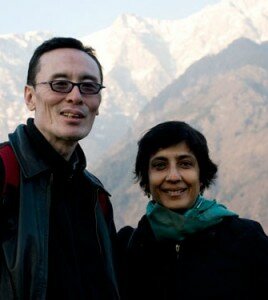(cross-posted in http://whitecranefilms.com/blog/)
Tromsø, a small town way up in the Arctic Circle, seems an unlikely spot for any kind of international cultural gathering but it is, in fact, the venue for Norway’s most attended cinematic event – the Tromsø International Film Festival. And this is where we found ourselves in January, almost exactly a year after our film, The Sun Behind the Clouds, screened at the Palm Springs International Film Festival and set us off on a roller coaster ride of festivals and screenings. It seemed an appropriately remote place to bring our journey to a close.
Tromsø’s a beautiful little town, set on an island surrounded by fjords and mountains, snugly clad under a thick layer of ice and snow. A bluish crepuscule cast an enchanted light for the best part of three hours around midday before fading into darkness. The town boasts many “northernmost” accolades, including the world’s northernmost Burger King! Interestingly, it’s also the home of electronica duo, Röyksopp, whose 2001 album, Melody A.M., was a big favourite of ours. But Tromsø is most famous for its Northern Lights, a sight we hoped to catch while in town. Sadly, aurora borealis remained in hiding for the four days we were there.
We expected the temperature to be well below freezing but in fact, after hitting -3°C the first day, it warmed up to just above zero and caused some concern among the festival organisers that their giant outdoor snow screen where some of the screenings were to be held might begin to melt. In the event, the snow screen held up. The festival screenings were divided between a number of cinemas spread around town, including a wonderful old theatre called Verdensteatret Kino, which was built in 1916. The festival was laid back in an efficient way, and our three screenings were well attended, including one sold out show.
Many thanks to Chungdak Koren and her team from the Norwegian Tibet Committee, who were present during the screenings to publicise the situation in Tibet. It was nice to see that even a town as distant as Tromsø has a local Tibet support group.
Meanwhile, in India, the Tibetan Youth Congress, who are distributing both the international and Tibetan language versions of the DVD in South Asia, launched the film in Sarnath during the Dalai Lama’s teachings. They had two packed screenings of more than a thousand people each. This was followed by two sold out screenings in Dharamsala. TYC reports brisk DVD sales with a fair number headed for Tibet. One of our goals in making this film was to do our best to make the film available in Tibet and China. To this end, we made a Tibetan version and also added options for Traditional and Simplified Chinese subtitles on the international version. We know from past experience that Tibet-related videos and CDs from India do end up in Tibet and China. A pirated version of our previous film, Dreaming Lhasa, was available in Beijing with home-made Chinese subtitles!
Now it is time to move on to our next film. More on that in our next update, which will be posted on our revamped White Crane Films website (http://whitecranefilms.com). Thank you all for sharing this journey with us. We hope to have you on board for the next one!






 a film by Ritu Sarin and Tenzing Sonam 2009 India/UK, 79 minutes
a film by Ritu Sarin and Tenzing Sonam 2009 India/UK, 79 minutes